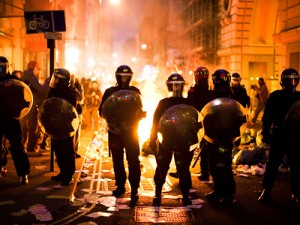Facebook, Twitter to oppose social media blocks during riots


The Guardian reports that the social networks will offer "no concessions" when they meet the members of the UK government tomorrow afternoon.
Government ministers are expected not to put forward plans to ban users or block social media sites in cases of further disruption, amid calls that it would infringe freedom of speech.
The home secretary, Theresa May, is looking to explore measures that social media sites, like Facebook and Twitter, can employ to assist law enforcement in tracking down those who incite and cause violence through use of the sites.
During the England riots, Twitter reiterated its call from earlier in the year during the Arab Spring uprising, saying that the "tweets must flow".
Facebook and Twitter are expected to outline their processes to remove content that could be inflammatory or break the law. Facebook said that it had removed "credible threats of violence" in a bid to quell riots across England.
Facebook also explained that many of its users are 'self-policing' and helped flag content which was deemed inappropriate or potentially harmful.
Research in Motion, the BlackBerry maker, came under heavy fire after many used the secure BlackBerry Messenger service to send encrypted and secure messages to others, organising further outbreaks of rioting across the country.
RIM is expected to explain its PIN-messaging system is secure, but also outline plans to assist law enforcement in tracking those who use the service to cause harm, but only where warrants are served.
The British intelligence services have been called in to crack the BlackBerry Messenger encryption, to track in real-time those who use the service to cause disruption.
It comes only two weeks after the riots subsided -- spreading from capital city London, through to Bristol, Nottingham, Birmingham and Manchester in the north of the country.
British prime minister David Cameron considered "turning off social networks" amid further riots -- including banning users from using social networks who incite violence and further civil disorder.
A number of people have been jailed for using Facebook to incite violence -- in some cases for four years, even though no disorder perpetuated from the Facebook posts.
Arguing that regardless of where social networks are based in the world -- Facebook and Twitter both based in the United States, and Research in Motion in Ontario, Canada -- all those involved in the talks have a UK presence, meaning they also have to operate under UK legislation.
Related content:
- CBS News: London riots: Tech's role in the thick of it
- Facebook, RIM, Twitter confirm UK government meeting over riots
- British PM considers turning off social networks amid further riots
- British spy agency called in to crack BlackBerry encryption
- ZDNet UK: Facebook riot posts lead to four-year jail terms